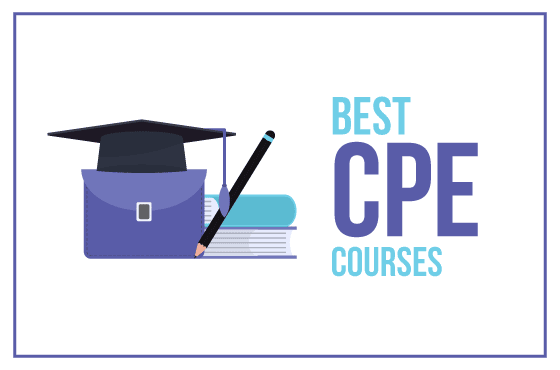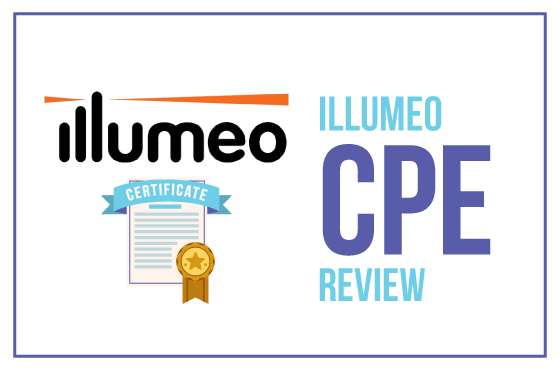If you’re reading this, congratulations on becoming a CPA! You’ll need to keep up with Continuing Professional Education (CPE) in order to keep your CPA license active. The last thing you want is your name sent out on a CPA association’s inactive list, so you’ll want to figure out how CPAs earn CPE credits and find solid continuing professional education options
In a Reddit thread called “What do you think the number one reason people lose their license (CPA) is?” the most upvoted answer was: Not doing CPE and making too much money to care. Although we hope you do make lots of money, losing your license over something as easy as getting CPE units isn’t something we want to see happen.
I’ve compiled a list of CPE information and credit resources that I’ve recommended to my former students and colleagues.
The Lowdown – Here’s What You Need To Know About CPE for Accountants

CPAs are required to obtain a certain number of CPE credits each year. CPE credits, or Continuing Professional Education credits, are a type of educational credit required by professionals in certain fields, such as accounting, finance, and law. These credits are designed to ensure that professionals stay up-to-date with the latest practices, knowledge, and regulatory changes in their field. These credits can be earned through various forms of learning, such as attending workshops, seminars, webinars, conferences, or completing relevant educational courses.
CPE Requirements: How Many CPE Credits to Earn
For Certified Public Accountants, earning CPE credits is essential to maintain a professional license. Requirements are based on the state in which you are licensed, with most states requiring 40 hours per year. This is sometimes listed as 40 hours annually, 80 hours biennially, or 120 hours triennially. Most states with biennial and triennial periods require that CPAs obtain a certain number of CPE credits per individual year, thus avoiding CPAs loading up on credits in a single year.

There are additional requirements regarding the time period, ethics credits (most commonly 4 hours per credit period), and limits on the types of courses you may take. For example, in Florida, the requirement is to obtain 80 credit hours biennially, with the two-year reporting period lasting from July 1st to June 30th. Additionally, those 80 hours must include 4 hours of ethics along with at least 20 hours of accounting credits and no more than 20 hours of behavioral credits.
College courses may also count towards the total, and 1 semester hour is equivalent to 15 CPE hours. For more detailed information on the requirements for your state, click here or see this table for your state’s CPE hourly requirements.
CPE Requirements by State
| State | Annual CPE Requirements | Biennial CPE Requirements |
|---|---|---|
| Alabama | 40 hours | 80 hours |
| Alaska | 20 hours | 80 hours |
| Arizona | 16 hours | 80 hours |
| Arkansas | 20 hours | 120 hours (over 3 years) |
| California | 20 hours | 80 hours |
| Colorado | 20 hours | 80 hours |
| Connecticut | 40 hours | 80 hours |
| Delaware | 20 hours | 80 hours |
| Florida | 20 hours | 80 hours |
| Georgia | 20 hours | 80 hours |
| Hawaii | 40 hours | 80 hours |
| Idaho | 20 hours | 80 hours |
| Illinois | 20 hours | 80 hours |
| Indiana | 20 hours | 80 hours |
| Iowa | 20 hours | 80 hours |
| Kansas | 20 hours | 80 hours |
| Kentucky | 20 hours | 80 hours |
| Louisiana | 20 hours | 80 hours |
| Maine | 20 hours | 80 hours |
| Maryland | 20 hours | 80 hours |
| Massachusetts | 20 hours | 80 hours |
| Michigan | 20 hours | 80 hours |
| Minnesota | 20 hours | 80 hours |
| Mississippi | 20 hours | 80 hours |
| Missouri | 20 hours | 80 hours |
| Montana | 20 hours | 80 hours |
| Nebraska | 20 hours | 80 hours |
| Nevada | 20 hours | 80 hours |
| New Hampshire | 20 hours | 80 hours |
| New Jersey | 20 hours | 80 hours |
| New Mexico | 20 hours | 80 hours |
| New York | 20 hours | 80 hours |
| North Carolina | 20 hours | 80 hours |
| North Dakota | 20 hours | 80 hours |
| Ohio | 20 hours | 80 hours |
| Oklahoma | 20 hours | 80 hours |
| Oregon | 20 hours | 80 hours |
| Pennsylvania | 20 hours | 80 hours |
| Rhode Island | 20 hours | 80 hours |
| South Carolina | 20 hours | 80 hours |
| South Dakota | 20 hours | 80 hours |
| Tennessee | 20 hours | 80 hours |
| Texas | 20 hours | 80 hours |
| Utah | 20 hours | 80 hours |
| Vermont | 20 hours | 80 hours |
| Virginia | 20 hours | 80 hours |
| Washington | 20 hours | 80 hours |
| West Virginia | 20 hours | 80 hours |
| Wisconsin | 20 hours | 80 hours |
| Wyoming | 20 hours | 80 hours |
How to Get CPE Credits
Here are some of the best ways to earn CPE:
- Online Self-Study Courses: Offered by various providers, allowing flexibility in learning.
- Webinars and Virtual Conferences: Hosted by professional organizations or educational institutions.
- In-Person Seminars and Workshops: Often organized by local accounting chapters or national organizations.
- Professional Conferences: National and international conferences hosted by industry bodies.
- University or College Courses: Relevant higher education courses can count towards CPE credits.
- In-house Training Programs: Offered by employers, particularly in larger accounting firms.
Other options for required professional education after passing the CPA exam:
- Published Articles and Research: Writing and publishing in professional journals can earn credits.
- Participation in Professional Boards or Committees: Involvement in industry-related boards or committees.
- Volunteering as a Speaker or Trainer: Presenting at industry events and seminars.
- Interactive Online Courses: Featuring engaging and interactive content for learning.
- Ethics Training Programs: Specific courses focused on professional ethics.
- Emerging Technology Workshops: Covering topics like data analytics and artificial intelligence.
- Vendor-Sponsored Training: On specific software or tools used in accounting.
Where Can I Find CPE Courses?
Below is a list of some great options when it comes to finding CPE courses on your own.
Becker CPE
Becker CPE is my personal because it’s easy to use, packed with quality content, and makes earning credits feel effortless. It strikes the perfect balance between flexibility and real-world value. Then even offer a free course (click the link.)
AICPA CPE
The AICPA has a full library and multiple options for CPE courses. The downfall is that none of these courses are free. However, if you’re a member of the AICPA, you are offered a discounted rate.
- Self Study Courses which can be purchased a la carte
- CPE Subscriptions which can be purchased for an annual fee
- CPExpress – this online subscription provides one year of unlimited access to CPE courses and includes a CPE tracking feature. The courses range from one to four hours.
- Annual Webcast Pass – this online subscription provides one year of unlimited CPE courses with no tests required to earn CPE credits. The courses range from one to eight hours.
- CPE Direct – this annual subscription mails you quarterly self-study publications each with a required exam. If the exam is completed, you can earn up to 12 credits per quarter.
NASBA CPE
This is a library of self-study courses for purchase along with annual subscriptions through a national registry of CPE sponsors.
Big 4 Firms
Each of the big 4 firms provide FREE online webcasts regularly. You can register for these courses as often as you’d like. These courses are great for CPAs who are self-employed or who are independent contractors.
- Deloitte Dbriefs
- Ernst & Young Thought Center webcasts
- PwC Professional Development Program
- KPMG Webcasts

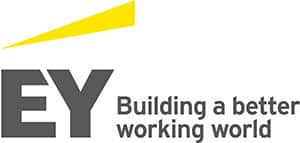


Additional CPE Courses
- The CPE Store – This is a huge library of self-study courses across all industries for purchase. Courses vary by topic and number of credits.
- Sequoia CPE – Purchase a CPE membership for an annual fee for unlimited access to all courses (except for ethics, which must be purchased separately).
Although it seems daunting, there are tons of great resources when it comes to finding the right CPE courses for you and your circumstances. Be sure to create a CPE tracking spreadsheet to keep track of your CPE credits from period to period.
Tips to get CPE credits if you work full-time for a public accounting firm
“All the big four firms offer free webinars with CPE credit!” – Reddit User Sunbeaaar
The Big 4 and other large accounting firms, especially the Big 4, CPAs have a structured approach to earning CPE credits. These firms integrate CPE opportunities into the regular workflow, providing a mix of in-office training, online courses, and opportunities to attend various conferences and training sessions. This integrated approach ensures that CPAs can conveniently meet both their firm’s and state’s CPE requirements, as well as those set by the AICPA (national association) for its members.

Additionally, these firms typically manage the tracking of completed CPE credits, keeping CPAs informed about their progress and alleviating the need for them to track these credits independently. This comprehensive support system is a significant benefit for CPAs working in such environments, as it streamlines the process of fulfilling ongoing professional education requirements. It also helps with reporting credit earnings since reporting CPE credits can be a stressful part of professional development.
Ultimately, you are responsible for tracking your own credits and ensuring that you meet the requirements. Your state board of accountancy expects that you‘re meeting the requirements based on the honor system. Each state does random audits; if they audit your CPE and find that you are in violation, you may be subject to punishment in the form of fines, probation, or other forms of reprimand, depending on the severity and jurisdiction.
Tips to get CPE credits if you work full-time in the private sector
This varies by company, but depending on where you work, the company may also provide you with enough training courses to cover your requirements. For example, a company with a large accounting department will be more likely to do this. A smaller company with only a few accounting staff may not.
If your company doesn’t provide you with all the courses you need, they may still reimburse you for the courses you take on your own. Alternatively, if your company doesn’t have a policy on this, it doesn’t hurt to ask! You may be surprised by how willing employers are to cover the costs. If your company is not willing to reimburse you for the costs, don’t worry – there are plenty of free courses available (more on that below).
Tips to get CPE credits if you work full-time in the private sector if you are self-employed
For self-employed CPAs, leveraging online resources is a practical approach to fulfilling CPE requirements. Many educational platforms and professional organizations offer a variety of CPE courses online, covering a wide range of topics from technical accounting principles to emerging trends in the industry. Networking with other professionals in online forums or local CPA chapters can also reveal lesser-known opportunities for free or low-cost CPE credits.
Additionally, attending industry conferences, either virtually or in person, often provides a wealth of knowledge along with CPE credits. While most courses are available at a cost, strategically choosing a combination of paid and free resources can balance the financial investment in continuing education. You can even earn CPE credits online.
Emerging Trends in Accounting and CPE Credit Hours
The world of accounting is continually evolving, with emerging trends and technologies significantly influencing both the profession and the Continuing Professional Education (CPE) requirements for CPAs. As we delve deeper into the digital age, areas like blockchain, artificial intelligence (AI), and data analytics are becoming increasingly relevant. These innovations are not just transforming the way accountants work but are also reshaping the landscape of CPE.

Blockchain Technology: Once primarily associated with cryptocurrencies, blockchain has now found its place in mainstream accounting. It offers a secure, transparent way to record transactions, which is revolutionizing auditing and compliance processes. Understanding blockchain’s implications on financial reporting and fraud detection is becoming crucial for CPAs, prompting the introduction of CPE courses focused on blockchain technology and its applications in accounting.
Artificial Intelligence and Machine Learning: AI and machine learning are redefining efficiency and accuracy in accounting. From automating routine tasks to providing advanced predictive analytics, AI is a game-changer. CPE courses are increasingly incorporating modules on AI, offering insights into how CPAs can leverage these technologies for data processing, financial forecasting, and strategic decision-making.
Data Analytics and Big Data: In an era where data is king, proficiency in data analytics is a vital skill for accountants. Big data technologies enable CPAs to analyze large volumes of data for better business insights and informed decision-making. CPE courses now often include training in data analytics tools and techniques, emphasizing how to interpret and apply data effectively in various accounting scenarios.
As these technologies continue to advance, CPE requirements are adapting to ensure that CPAs remain at the forefront of the accounting profession. Staying updated with these trends through CPE not only fulfills educational requirements but also empowers CPAs with the knowledge and skills to navigate the ever-evolving landscape of accounting.
Case Studies and Testimonials: CPAs Earning CPE Credits
Case Study 1: Embracing Online Learning for Flexibility
Maria Gonzalez, CPA – Small Business Accountant Maria, a CPA specializing in small business accounting, found her niche in online self-study courses. Juggling a busy schedule, she opted for a series of webinars and virtual workshops that focused on tax law changes and small business finance. The flexibility allowed her to earn CPE credits at her own pace while staying updated with the latest accounting standards. Maria’s testimonial: “Online courses were a game-changer for me. They fit perfectly into my hectic schedule and kept me at the forefront of accounting practices relevant to my clients.”
Case Study 2: Leveraging In-Person Seminars for Networking
John Anderson, CPA – Corporate Auditor John, working as a corporate auditor, attended an in-person CPE seminar focusing on advanced auditing techniques. Not only did he earn his required CPE credits, but he also expanded his professional network. He emphasizes the value of face-to-face interactions and real-time discussions with peers and experts. John’s reflection: “The in-person seminar didn’t just offer CPE credits; it was a valuable networking and learning experience that enriched my professional skills and connections.”
Case Study 3: Continuous Learning in a Big Four Firm
Aisha Patel, CPA – Tax Consultant Aisha, employed at one of the Big Four accounting firms, benefitted from the firm’s integrated approach to CPE. Through a mix of in-house training, online courses, and national conferences, she managed to exceed her CPE requirements. Aisha shares: “The variety of CPE options provided by my firm not only kept me compliant but also significantly broadened my expertise, particularly in international tax laws.”
Testimonials from CPAs
- Ethan Taylor, CPA – Independent Consultant “I’ve found that mixing online courses with a few key in-person events throughout the year is the best strategy for me. The online courses offer convenience, while the in-person events provide irreplaceable industry insights.”
- Linda Cho, CPA – Nonprofit Financial Advisor “As someone working in the nonprofit sector, I specifically look for CPE courses that address the unique challenges and regulations of nonprofit accounting. These specialized courses have been instrumental in my professional development.”
- Rajesh Singh, CPA – Forensic Accountant “Engaging in CPE focused on forensic accounting has not only met my CPE requirements but also significantly enhanced my investigative skills, which is crucial in my field.”
Conclusion
Reflecting on my journey as a CPA, the pursuit of Continuing Professional Education (CPE) credits has been a pivotal aspect of my professional growth. Each course and seminar has not only met licensure requirements but also profoundly enriched my expertise and understanding of the dynamic accounting landscape. This process of continuous learning has been crucial in keeping me updated with evolving industry trends and enhancing my skills. As a CPA, I’ve come to view CPE as an invaluable opportunity for personal and professional development, essential for maintaining the high standards and integrity of our profession in a constantly changing world.
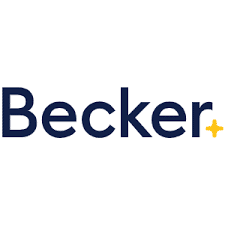
$148 on Becker EA CE Subscription

Enjoy $320 Off Becker CPE Prime

$572 Off Becker CPE Prime (2-Year)
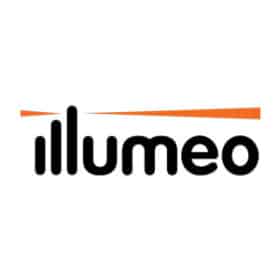
Get 15% Off Illumeo CPE Premium Subscription

Take 15% Off Illumeo CPE Premium Subscription

Enjoy Up to 25% Off Becker CPE Course Bundle

Get 30% Off Becker CPE Course Bundle

Score Up to 30% Off Becker CPE Course Bundle

Up to 30% Off Becker CPE Course Bundle

Take 30% Off Becker CPE Course Bundle

Exclusive Offer – 10% Off Lambers CPE Courses
FAQs
CPE credits are essential for CPAs as they ensure the maintenance of accounting knowledge and skills, and adherence to the latest industry standards and regulations. Earning these credits is mandatory for keeping a CPA license active and in good standing.
The number of required CPE credits varies by state. Generally, most states require 40 CPE hours annually, but it can range from 20 to 120 hours over different reporting periods. It’s important to check with your specific state’s accountancy board for exact requirements.
Yes, online courses are a popular way to earn CPE credits. They offer flexibility and a wide range of topics. These courses must be taken from approved providers and meet certain educational standards to be eligible for CPE credits.
Most states require a specific number of CPE credits to be earned in professional ethics. The exact requirement varies by state, but it generally involves completing a course focused on the ethical standards and practices within the accounting profession.
CPAs are generally required to report their CPE credits to their state board of accountancy. The reporting process can vary, so it’s important to check with your state board for specific guidelines. Some states require submission of certificates or detailed logs of CPE activities.
An exploration of any distinct or specific CPE mandates for CPAs in areas like forensic accounting, international tax, or IT auditing
Insights into the possibility of CPAs transferring extra CPE credits they accumulate to subsequent reporting cycles and the regulations surrounding this practice.
Details about scenarios where CPAs might be excused from fulfilling CPE obligations, such as retirement, career hiatuses, or health-related issues.
An overview of potential penalties or consequences for CPAs who fail to satisfy their CPE requirements, and the process for license reinstatement.
Bryce Welker is a regular contributor to Forbes, Inc.com, YEC and Business Insider. After graduating from San Diego State University he went on to earn his Certified Public Accountant license and created CrushTheCPAexam.com to share his knowledge and experience to help other accountants become CPAs too. Bryce was named one of Accounting Today’s “Accountants To Watch” among other accolades. As Seen On Forbes
